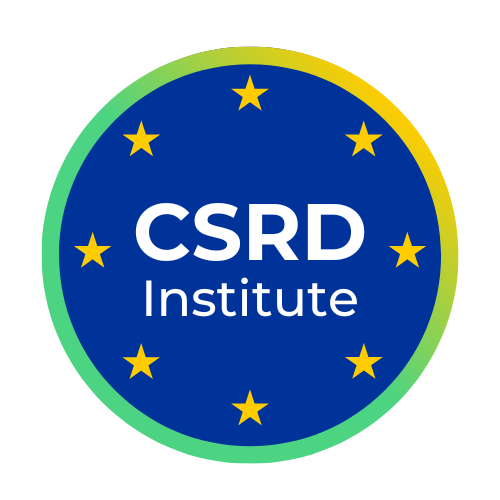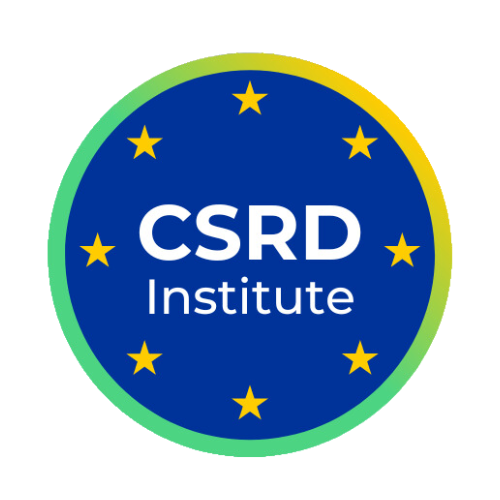The ESRS
(European Sustainability Reporting Standards)
What are ESRS and why they matter
The ESRS (European Sustainability Reporting Standards) are a set of standardised disclosure requirements for companies operating in the EU, required under the Corporate Sustainability Reporting Directive (CSRD).
The ESRS consists of 12 standards, and they cover environmental, social, and governance (ESG) topics, including two cross‐cutting standards and ten topic‐specific (topical) ones.
The two cross-cutting standards, ESRS 1 and ESRS 2, define the general reporting principles and the CSRD fundamental concepts. This includes double materiality and reporting boundaries, as well as the overarching disclosures that are to be made by all companies within the scope of the CSRD.
The ten topical standards include specific reporting requirements for environmental, social and governance matters.
The goal is to ensure consistent, transparent sustainability reporting so stakeholders (investors, regulators, civil society) can better compare and hold companies accountable.
Structure: what the current set consists of
The ESRS consists of 12 standards divided into two categories: cross-cutting standards and topical standards.
Cross-Cutting Standards
ESRS 1 and ESRS 2:
○ Define general reporting principles and fundamental CSRD concepts.
○ Include key concepts such as double materiality and reporting boundaries.
○ Mandate overarching disclosures required from all companies within the CSRD scope.
Topical Standards
Environmental, Social, and Governance Matters:
○ There are 10 topical standards that provide specific reporting requirements for these areas.
○ Each standard addresses detailed aspects of sustainability relevant to its category.
The current status: draft revisions and simplification
The ESRS was formally adopted in 2023 through a delegated regulation.
In early 2025, the European Commission proposed an Omnibus simplification package to reduce burdens and improve clarity, prompting EFRAG (the technical body developing these standards) to create revised, simplified ESRS.
On 31 July 2025, EFRAG released Exposure Drafts of these revisions for public consultation until 29 September 2025.
EFRAG will submit its final technical advice to the European Commission by 30 November 2025, after which the Commission will adopt the revised ESRS via a delegated act.
Companies are expected to implement these revised standards for the fiscal year 2027, with reports published in 2028, though early adoption may be possible.
Key proposed changes: what’s being simplified
The current draft proposes key changes compared to earlier versions, aiming to reduce the administrative burden on reporting companies while maintaining rigour and alignment with EU sustainability goals.
What is Proposed
-
Reduction in data points / disclosuresMandatory data points are proposed to be reduced by ~57%. If you include voluntary disclosures, the total data points (mandatory + voluntary) are down by ~68%.
-
Removal or separation of voluntary content
Voluntary (“may”) disclosures are removed from the main text of standards; moved to illustrative or non‐mandatory guidance. Topical standards will mainly contain mandatory disclosure requirements and associated application requirements. -
Structure and readability improvements
The drafts aim for clearer, more concise standards. Repetition across topics is reduced. Narrative disclosure requirements are simplified. Language clarified. -
Double Materiality Assessment (DMA) simplified
The process by which companies assess what sustainability topics are material (both in terms of impact on enterprise and impact on environment / society) is being streamlined. There is more flexibility, more principle‐based requirements, top‐down approach, etc. -
Relief mechanisms and flexibility
Proposed reliefs include: “undue cost and effort” exceptions, more pragmatic approaches for value chain disclosures, allowing exclusion of non‐material activities from metric calculations, flexibility where data isn’t reasonably available (e.g. acquisitions/disposals) etc. -
Greater alignment / interoperability
There is stronger alignment with other sustainability / climate standards (e.g. ISSB, IFRS S1/S2) to prevent duplication for companies reporting under multiple regimes. The wording, metric definitions, etc., are being made more consistent wherever possible.
Why this matters: balancing ambition and feasibility
These revisions highlight a global tension in sustainability reporting: the need for strong, comparable, credible reporting to support climate and ESG goals, versus the risk that overly complex or lengthy reporting can be counterproductive (costly, time-consuming, prone to box-ticking, etc.). The simplified ESRS aims to maintain rigour and transparency while being more user-friendly and less burdensome. If successful, this should enhance reporting quality, lower non-compliance risks, and improve disclosure reliability.
Opportunities for enhanced competitiveness
The draft revised ESRS represents a significant change: shifting from a detailed, prescriptive framework to a more streamlined, principle-based approach that maintains accountability. For affected companies, this offers an opportunity to reassess and prepare for upcoming feedback on the exposure draft and anticipated changes in reporting requirements in a few years.
Continuous Professional Development in sustainability reporting
How can you best navigate the evolving EU regulations and effectively manage increasing stakeholder expectations?
At the CSRD Institute, we can help you understand the Corporate Sustainability Reporting Directive (CSRD) including the European Sustainability Reporting Standards (ESRS) and keep you informed about the latest updates in CSRD reporting regulations and the simplified ESRS.
Our CPD accredited certification courses provide the most current insights on the CSRD, including the “Stop-the-clock” Directive and the “Quick-Fix” Delegated Act, with interactive notes on proposed EU Omnibus changes and on the key revisions to the ESRS.
We are dedicated to offering relevant and comprehensive education on all aspects of the CSRD including the ESRS and will continually monitor developments to keep our courses aligned with changing standards and needs.
Continuing Professional Development (CPD) in sustainability reporting is increasingly essential and enables individuals to maintain their relevance and adaptability in their careers, while also helping organisations ensure compliance, enhance credibility, and build resilience.
Join one of our CSRD certification courses to gain the skills and knowledge needed to succeed in this changing regulatory environment and gain valuable CPD credits for your ongoing professional development.

Copyright © 2025
